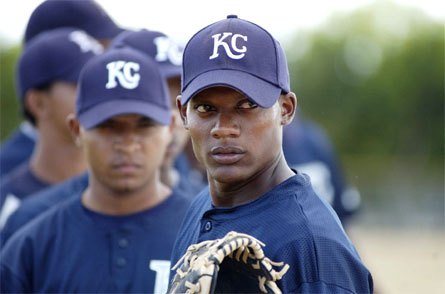 ALGENIS PEREZ SOTO AS "SUGAR"So near and yet so far
ALGENIS PEREZ SOTO AS "SUGAR"So near and yet so farAlgenis Perez Soto shines in an understated performance as Miguel "Sugar" Santos, the Dominican pitcher who comes to the US and winds up in the minor leagues. A young man who was a baseball player himself, Soto doesn't have to be able to speak English: part of the story is that he is lost in the language. When he's interviewed for the local radio, his interpreter can't even speak English well. This is a squeaky-clean and earnest version of the raucous, cynical story of rags to riches to rags athletic stardom told in Carlos Cuarón's
Rudo y Cursi, a movie that's a lot more fun, but so arch and calculated it doesn't feel real. This one is corny, but it has the ache of truth in its awkward moments, like when Sugar orders "French toast" because he can't explain in English how he wants his eggs cooked.
Sugar's story is less dramatic but perhaps more truthful than Carlos Cuarón's.
Sugar also is about American baseball, which draws a lot of its foreign players from the Dominican Republic, where this one comes from, while
Rudo y Cursi all takes place in Mexico and is about soccer players.
An oddity of
Sugar is that it feels outwardly very conventional -- despite its non-Hollywood finale, it adds little to the machinery of a hundred sports movies -- but tells a different and contemporary story, because its focus is on what it's like to be an immigrant Latin American worker in the US who comes and lives at the whim of sports managers. It has a documentary validity (documentaries are often stylistically unimaginative too) and connects with American baseball fans and Hispanics who live in America, and, telling this double story of sports and immigration with a straightforward freshness, it has scored big with American reviewers too.
Sugar's camerawork can be obtrusive, but the film has a fresh, vivid look that suits the newly-minted young athletes in heir brand new uniforms. The naivety of the scene is underlined by the simple Catholicism of the imported players and the pious Protestants who dominate the small-town Iowa world where Sugar becomes a minor-league pitcher.
"Understated" describes Soto's performance, but his role makes him into a good-looking, good-natured stump. He is in one dialogue scene after another where he says nothing, because he doesn't yet understand colloquial English, and he rarely seems to encounter an American capable of crossing the language barrier, who knows enough Spanish, or can simplify his English or talk slowly enough, to have a decent conversation with him. Meanwhile, as Miguel's English still falters but he shines as a pitcher, the film pushes the theme that the Dominican players are only in the US so long as they play well and get along with their coach. There is an undercurrent of washouts, and Boden and Fleck found in researching the story that import players as often went back on their own as because they were forced to. The thematic undercurrent at all times is culture shock -- an alienation that is softened by paychecks that to the impoverished players seem generous and by roaring crowds, local sports page headlines, kids asking for autographs -- but heightened by that nagging ignorance of the language and made devastating when their athletic performance falters. And the Dominicans aren't just Hispanic; they're black, and stand out in small-town Iowa like sore thumbs.
But it's Miguel's foreignness and lack of English that alienate him. In one drawn-out sequence, he walks through a big gaming hall and comes to where a black American player friend is laughing and connecting with a white boy and girl, and he turns around and walks back. This is the player (from Berkeley) who has discovered Miguel has heard of neither Roberto Clemente nor Babe Ruth.
Variety calls this film "exceedingly wholesome," and sometimes it's almost unbearably so, especially if baseball has little magic for you. But Boden and Fleck, who showed close observation of character and milieu in their debut
Half Nelson, maintain that standard here, welding together careful research, good casting, and a slowly but surely unfolding story line whose greatest appeal is the way it avoids the feel-good story arc its sports drama format would seem to imply. Too bad they feel obligated to swerve so far in the other direction into feel-bad territory that they turn Miguel an object of pity, allowing their sympathy to overflow into condescension -- till, belatedly and a little too easily, things lighten up at the end.





